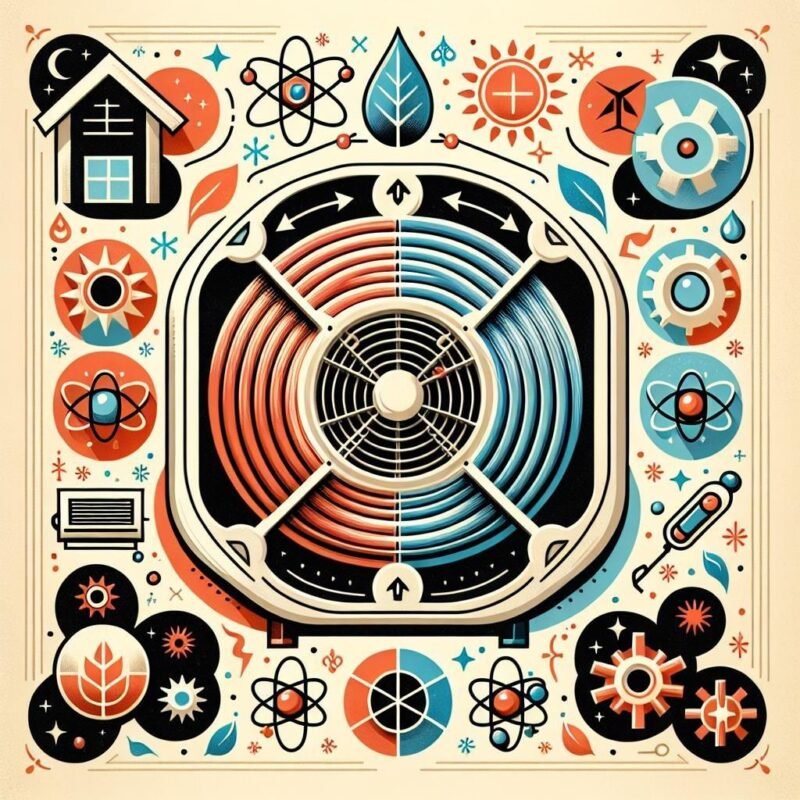Can a mini split AC system be used in extreme temperatures?

Picture this: It’s a scorching summer day, the kind where eggs could fry on the sidewalk, or a bone-chilling winter night when even your coffee freezes before you can take a sip. In these extreme weather scenarios, homeowners often wonder if their trusty mini split AC system can handle Mother Nature’s wild mood swings. As we’ve watched these sleek, wall-mounted units become increasingly popular in homes across the globe, it’s time to answer the burning question (or should we say freezing question?) that’s on everyone’s mind: Can these modern marvels really keep up when the mercury goes haywire?
Mini Split AC Performance in Scorching Heat and Freezing Cold: What You Need to Know
When temperatures soar into triple digits or plummet below freezing, your comfort depends on your cooling and heating system’s ability to handle these extremes. Today’s advanced mini split systems are engineered to operate efficiently in temperatures ranging from -13°F to 122°F (-25°C to 50°C). Most quality units maintain 100% of their rated heating capacity down to 5°F (-15°C) and can still deliver up to 80% capacity in sub-zero conditions. During intense summer heat, they continue to cool effectively while using innovative features like variable-speed compressors and enhanced coil designs.
The key to optimal performance lies in proper sizing and installation for your climate zone. Here’s what makes these systems excel in challenging conditions:
- Advanced defrost cycles prevent ice buildup in winter
- Multi-stage compression adapts to temperature extremes
- Cold climate models feature base pan heaters
- High-efficiency fan motors maintain airflow in any weather
| Temperature Range | Performance Level |
|---|---|
| -13°F to 5°F | 80% Capacity |
| 5°F to 115°F | 100% Capacity |
| 115°F to 122°F | 90% Capacity |
Getting the Most from Your Mini Split: Temperature Thresholds and Operating Sweet Spots
When it comes to optimizing your ductless system’s performance, finding the perfect temperature setting can make a big difference in both comfort and energy bills. While these versatile units can operate in a wide range of conditions, they truly shine when set between 68-78°F (20-26°C) for cooling and 70-76°F (21-24°C) for heating. Think of it as finding your mini split’s “comfort zone” – that sweet spot where efficiency meets coziness.
Your mini split’s efficiency isn’t just about the temperature setting; it’s about maintaining a consistent indoor climate. Here are some key factors that help you maximize performance:
- Keep temperature swings minimal (within 2-3 degrees)
- Use ”Auto” mode during moderate weather
- Enable dehumidification in humid conditions
- Schedule regular maintenance checks
| Mode | Ideal Setting | Energy Impact |
|---|---|---|
| Cooling | 75°F | Optimal |
| Heating | 72°F | Efficient |
| Auto | 73°F | Balanced |
Smart Tips to Help Your Mini Split Handle Weather Extremes Like a Champ
Your mini split system can handle tough weather conditions with a few clever tweaks. Keep those outdoor units sheltered from direct exposure by installing an awning or weather shield, but make sure to maintain proper airflow clearance. During scorching summers, spray a gentle mist of water around (not directly on) the outdoor unit to help cool the surrounding air, and regularly clean those filters to prevent your system from working overtime. In winter, elevate the outdoor unit above typical snow levels and ensure the condensate drain stays clear of ice buildup.
Timing is everything when it comes to maximizing efficiency in extreme temperatures. Pre-cool your space before peak heat hours and maintain a consistent temperature rather than making dramatic adjustments. Install a programmable thermostat to automate temperature changes, and consider using ceiling fans to distribute conditioned air more effectively. On brutally cold days, supplement your mini split with thermal curtains and door draft stoppers to maintain indoor comfort without overtaxing the system.
- Install a protective awning or hood
- Maintain 12-inch clearance around units
- Schedule seasonal maintenance checks
- Use a surge protector for power fluctuations
- Monitor refrigerant levels regularly
| Temperature Range | Recommended Actions |
|---|---|
| Above 95°F | Pre-cool + Misting |
| Below 32°F | Base Heating + Draft Prevention |
Maximizing Comfort Year Round: Essential Mini Split Features for Challenging Climates
When faced with scorching summers and bone-chilling winters, your mini split system needs specific features to maintain peak performance. Advanced inverter technology plays a crucial role by automatically adjusting the compressor speed to match your comfort needs while minimizing energy consumption. The latest models come equipped with enhanced defrost cycles and base pan heaters that prevent ice buildup during harsh winter conditions, ensuring uninterrupted operation even when temperatures plummet below freezing.
Smart climate control features elevate your comfort experience by adapting to extreme weather patterns:
- Hot Start technology prevents cold drafts during heating cycles
- Humidity sensors optimize dehumidification in muggy conditions
- Self-diagnostic systems alert you to potential performance issues
- Follow-me temperature sensing adjusts output based on your location
| Feature | Cold Climate Benefit | Hot Climate Benefit |
|---|---|---|
| Hyper Heat | Operates at -13°F | Enhanced efficiency |
| i-See Sensor | Prevents cold spots | Targets hot zones |
Q&A
Q&A: Can a Mini Split AC System Be Used in Extreme Temperatures?
Q1: What is a mini split AC system, and how does it work?
A1: Great question! A mini split AC system, often called a ductless system, is a stylish and efficient way to cool – or heat! – individual rooms. It consists of an indoor unit and an outdoor compressor. The magic happens through refrigerant lines connecting the two, allowing for flexible temperature control without the bulky ducts. It’s like having your own personal climate wizard!
Q2: Are mini split AC systems effective in both extreme heat and cold?
A2: Absolutely! Mini splits are quite the versatile heroes. Modern systems come equipped with advanced inverter technology, making them capable of cooling or heating effectively in various temperatures. However, keep this in mind: efficiency can drop as temperatures soar over 95°F (35°C) or plunge below 5°F (-15°C). That said, many units are designed to work efficiently even in these temperature extremes.
Q3: Is it true that I can use a mini split in regions with very high temperatures?
A3: Definitely! Mini splits shine in scorching weather. They help maintain a steady, cool oasis even outside when the sun is blazing. Just make sure your model is rated for high temperatures and consider placing the outdoor unit in a shaded spot to give it a break from the brutal sun!
Q4: What about freezing temperatures? Can a mini split handle that?
A4: Excellent point! Many mini split systems are built for cold climates, with some models operational down to -5°F (-20°C) or lower! However, in extreme cold, you might notice slight dips in efficiency or have to rely on supplementary heating units. If you live in a winter wonderland, look for a unit specifically designed for low temperatures.
Q5: Any special tips for using a mini split in extreme temps?
A5: You bet! For heatwaves, ensure that filters are clean, and the outdoor unit is free of debris for optimal airflow. In the chill of winter, insulating your home can make a world of difference. Also, using a heat pump function can be efficient in those cooler months!
Q6: Can I expect my energy bills to skyrocket if I run my mini split constantly in extreme weather?
A6: This is where mini splits truly excel! While every climate control system uses energy, mini splits are often more efficient than traditional systems, especially if you’re targeting specific rooms. With proper maintenance and smart usage, you can keep bills in check even during extreme weather, making you a savvy savings wizard!
Q7: How do I ensure my mini split system runs smoothly in extreme temperatures?
A7: To keep your trusty system performing at its best, regular maintenance is key! Schedule annual check-ups, change filters, and keep an eye on the outdoor unit. Create a balance between comfort and efficiency, and enjoy your perfect indoor climate, rain or shine!
Remember, whether you’re facing the sweltering heat or braving the icy winds, your mini split AC system can be your reliable companion for year-round comfort! 🌈❄️☀️
The Conclusion
As we wrap up our exploration of mini split AC systems and their performance in extreme temperatures, it’s clear that these versatile units are more resilient than one might think. Whether you’re battling the sweltering heat of summer or braving the chill of winter, a mini split can be a reliable companion in your quest for comfort. Just remember, like any hero, it has its limits—so choosing the right model for your specific climate and ensuring proper maintenance will help it thrive through the extremes.
So as you dive into your home comfort journey, don’t shy away from embracing the power of mini splits. With the right care and a pinch of awareness, you can savor a perfectly climate-controlled oasis, no matter what nature throws your way. Here’s to cozy winters and cool summers—the mini split way! Stay comfortable, friends!






















